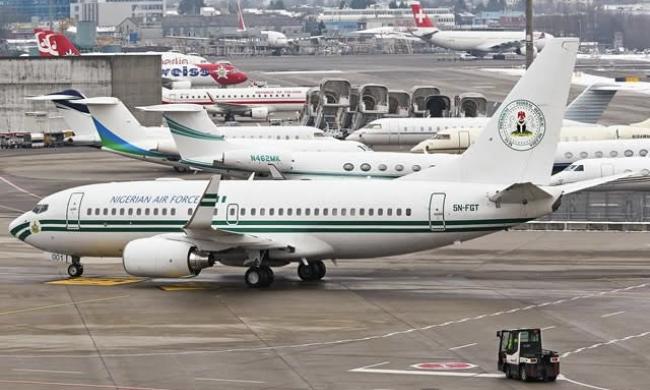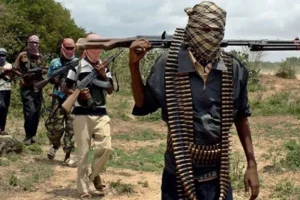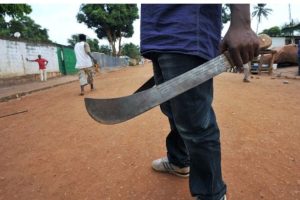
The legal dispute between Ogun State, the Federal Government of Nigeria, and the Chinese company Zhongshan Fucheng Industrial Investment Co. Limited over the seizure of presidential jets in Paris, France, continues to unfold. The conflict stems from an alleged breach of contract between the company and Ogun State.
Zhongshan Fucheng is seeking to enforce a judgment awarded in its favor on March 26, 2021, against Ogun State. However, Prince Adewole Adebayo, a former presidential candidate of the Social Democratic Party (SDP) in the 2023 general election and an international lawyer in this interview with Lekan Bilesanmi of Vanguard weighed in on the matter.
Adebayo described the judgment leading to the seizure of the presidential aircraft as a temporary setback.
Q: In this complex situation, where do you think things went wrong between the Ogun State Government and the Chinese firm, leading to the seizure of federal government assets?
A: The issues began when the company and the state government, who were supposed to be partners, became opponents and started litigating. Typically, a country seeks international investment, but sometimes these business agreements outlast the tenure of the incumbent governor. The successor might not understand the importance of the contract and may decide to terminate it, saying they no longer want the company’s services. However, when you engage investors and sign contracts internationally, you are not just signing commercial agreements; you might also be entering into treaties. In cases of disputes between the government and the investor, the investor has the option to sue in a regular court, go into arbitration, or engage in state treaty arbitration. For example, if a Nigerian company is doing business in China, there might be an international agreement that allows for arbitration through the treaty mechanism, as both Nigeria and China are signatories.
It’s crucial to understand that the original dispute is not a federal government obligation but an obligation of Ogun State. However, under public international law, subdivisions and sub-nationals like states are not recognized. Therefore, if any of the 36 states in Nigeria has an international obligation, Nigeria as a whole is held accountable, which is how Nigeria became implicated in this matter.
It’s important to note that this is not a loan situation where national assets were used as collateral. This was a business agreement between Ogun State and a Chinese private firm. The firm has gone to arbitration, alleging that Ogun State breached the contract by preventing them from making progress, causing them to incur losses, which led to arbitration. When the arbitration award is against you, it is advisable to pay to maintain your reputation. However, sometimes the state entity might be advised by its lawyers that the arbitrators made a mistake, acted beyond their jurisdiction, or misconducted themselves, leading to further litigation. There might also be a lack of political will to address the issue, or it might be handled casually.
The interim attachment of the presidential jets doesn’t mean that the jets have been lost because, under international law, assets of the federal government used for diplomacy and money kept in the Central Bank for central banking activities are immune from attachment. No court can seize them. It’s important to understand that when an interim order is granted, typically only one side is heard, and the court has not yet heard from Nigeria. The Chinese firm might argue that these are aircraft like any other, subject to maintenance in France, and can be seized. However, once Nigeria appears in court and demonstrates, with assistance from the French foreign ministry, that these are diplomatic assets, the court will likely lift the seizure. This does not negate the obligation to pay the judgment debt once litigation is concluded, but it does mean that you cannot attach assets belonging to a sovereign nation like Nigeria.
Q: What do you think is the worst-case scenario for Nigeria in terms of payment in this ongoing case?
A: The worst-case scenario is that Nigeria will have to pay the arbitration award, or a portion of it. As a lawyer, it is difficult to second-guess the outcome, especially when not handling the case directly. However, given the current situation of the Chinese company, I have been in a similar position against the Attorney General of Nigeria multiple times, even threatening to seize assets. In fact, I have previously seized the assets of this same government in London.
From my experience, I would advise the government to be mindful of its commercial reputation. Nigeria is operating a neoliberal government, and much of its macroeconomic policy relies on attracting foreign direct and portfolio investments. You don’t want to be perceived as difficult to do business with. Nigeria has excellent lawyers and a highly litigious environment, which has been the case for many years. For instance, there was a case where Paul Danny of England made negative comments about Nigeria’s attitude toward meeting its obligations. Nigeria is known as a tough customer—when they owe you, they may argue it to the end.
In some cases, Nigeria has successfully defended itself, like in the case of P&ID, where it would have been a disservice to the country to pay the $13 billion without scrutiny. That scrutiny saved the country a massive amount of money and prevented millions from falling into poverty. However, challenging such cases can also lead to difficult situations, though it’s usually a temporary embarrassment. I believe that the presidential aircraft will be released in the next proceeding, but that doesn’t mean the obligation to pay the judgment debt will be extinguished. It simply means Nigeria can breathe easier and focus on negotiating the terms.
Additionally, the Attorney General should advise other state attorneys general to be careful when entering obligations with international entities. If you agree to arbitration, you must understand its implications. The Attorney General of Nigeria should have advised Ogun State on how to resolve this matter because none of the 36 states is known internationally. We need a system that convinces the international community that we are serious people. One governor should not sign an agreement only for the next to cancel it due to politics or other reasons unrelated to the investor, which leads to trouble.
Many Nigerians and international investors have lost assets due to such actions. I have been a victim of this myself, bringing investors into the country who were later thrown out by a new administration. The key lesson is to ensure that our courts are fair and respected so that investors and partners are confident in litigating in Nigeria. The current trend is that people believe the Nigerian court system is too slow and unlikely to deliver justice, leading them to insist on international arbitration clauses in their agreements. This not only costs us money and reputation but also the opportunity to resolve issues domestically.
Q: It appears Nigeria may be fighting this battle in multiple jurisdictions as the Chinese firm is threatening to take the case to other countries like the UK. How difficult do you think this could be for Ogun State and Nigeria, legally speaking?
A: For Ogun State, Nigeria is the guarantor. Internationally, no one recognizes Ogun State, and I doubt it has any assets that could be exposed. The most that could happen to Ogun State is that the Attorney General may decide to deduct the owed amount from the state’s FAAC allocation. These are pressure tactics, and just because the battle is taken to the UK or the US doesn’t mean assets will be seized, as the laws in these countries are very clear. Attaching the assets of a sovereign state is difficult.
The judgments obtained in other jurisdictions, like the UK, are similar in nature and recognize that Nigeria agreed not to assert immunity in enforcing certain judgments. However, this does not mean that specific assets lose their immune status. The Chinese firm’s actions are more about putting pressure on Nigeria and keeping the country in the negative news cycle. This can affect Nigeria’s ability to raise bonds or deal with investors, as it raises concerns about the country’s debt situation. These are tactics to embarrass Nigeria and pressure it into settling.
Nigeria is notoriously difficult to recover debts from. I’ve been involved in litigation where $60 million was spent just to recover from Nigeria, and it took years. Nigeria is a tough customer internationally. If the Ogun State government wants to make the state attractive to business, it should focus on that rather than engaging in legal battles in Paris. As a lawyer and a patriotic Nigerian, I would still advise international businesses to be cautious about dealing with Nigeria, given the country’s reputation for being litigious and difficult to recover from. However, overall, there is no need to panic. This situation is not unusual. The judgment creditor is trying to apply pressure through multiple jurisdictions, but they may not recover anything. They are simply seeking attention, and it’s important to remember that China is a powerful partner that Nigeria cannot afford to offend.





